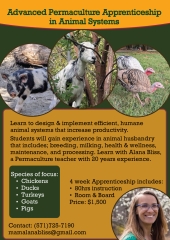
 3
3








The ultimate goal of farming is not the growing of crops, but the cultivation and perfection of human beings. - Masanobu Fukuoka
 1
1




It's time to get positive about negative thinking  -Art Donnelly
-Art Donnelly
 1
1




"To oppose something is to maintain it" -- Ursula LeGuin




hubert cumberdale wrote:i like to tell people its farming with style. but what really gets people going is just seeing my forest garden. after that they are hooked.
 1
1




 5
5








Idle dreamer





 1
1




It's time to get positive about negative thinking  -Art Donnelly
-Art Donnelly
 1
1




Get involved -Take away the standing of corporations MovetoAmmend.org
 1
1




Seed the Mind, Harvest Ideas.
http://farmwhisperer.com




 1
1




Lawrence London lfljvenaura@gmail.com
Venaura Farm http://venaurafarm.blogspot.com
Avant Geared http://www.avantgeared.com
Permaculture Mailing List http://lists.ibiblio.org/mailman/listinfo/permaculture




Lawrence London lfljvenaura@gmail.com
Venaura Farm http://venaurafarm.blogspot.com
Avant Geared http://www.avantgeared.com
Permaculture Mailing List http://lists.ibiblio.org/mailman/listinfo/permaculture





yurt rentals ° permaculture ° sculptures ° paleotechnics ° resource guide ° whitewater kayak camping how-to
www.earthenexposure.com
 2
2




 1
1





 2
2




mike mclellan wrote:This is not original but I liked it when I heard on Will Hooker's permaculture NCSU videocast: "Permaculture is revolution disguised as gardening."




"You may never know what results come of your action, but if you do nothing there will be no result”
How Permies.com Works
Be Nice




SE, MI, Zone 5b "Opportunity is missed by most people because it is dressed in overalls and looks like work."
~Thomas Edison
 1
1









 1
1




Cliff Martin wrote: The wilderness doesn't need humans; humans need the wilderness.
Idle dreamer




 1
1




Certifiable food forest gardener, free gardening advice offered and accepted. Permaculture is the intersection of environmentalsim and agriculture.
 1
1




1. my projects




Cliff Martin wrote:If by "apex" you mean humans have a unique or irreplaceable role in nature, I can certainly understand that perspective. In my opinion, the wilderness is bigger than any species and hence can absorb extinctions (as it does now).
Idle dreamer
 1
1




Certifiable food forest gardener, free gardening advice offered and accepted. Permaculture is the intersection of environmentalsim and agriculture.





 In previous meteor extinction events, all life was not extinguished, so the position "humans have a responsibility to save life from meteor" implies that specific existing forms of life have intrinsic value, that some or all species actually aren't replaceable (in other words, they are irreplaceable).....Do we have the responsibility to preserve specific species from extinction not by meteor? For instance tigers going extinct though human activity, do we have a responsibility to preserve them from extinction through human activity, or only a responsibility to preserve them from extinction by meteor?
In previous meteor extinction events, all life was not extinguished, so the position "humans have a responsibility to save life from meteor" implies that specific existing forms of life have intrinsic value, that some or all species actually aren't replaceable (in other words, they are irreplaceable).....Do we have the responsibility to preserve specific species from extinction not by meteor? For instance tigers going extinct though human activity, do we have a responsibility to preserve them from extinction through human activity, or only a responsibility to preserve them from extinction by meteor?
Idle dreamer




Certifiable food forest gardener, free gardening advice offered and accepted. Permaculture is the intersection of environmentalsim and agriculture.




Idle dreamer








My uncle always said, "Raising beds is better than wetting them".




Tony Elswick wrote:depends on the topic of conversation really
Economic
1)I always have seen permaculture as the practice of Austrian economics. Permaculture production is the optimal human action response to inflated prices, ushering in a cost efficient mechanism to bring all markets to equilibrium.
Scientific
2)Permaculture is a biotrophic effect from adding a human function to mycorhizzal symbiosis for purposes of fostering diverse elements of soil life.
Philosophic
3)As above, so below, along the edge we will know.
Yes, I'm that David The Good. My books are here: http://amzn.to/2kYcCKp. My daily site is here http://www.thesurvivalgardener.com and my awesome videos are here https://www.youtube.com/subscription_center?add_user=davidthegood




Soaking up information.




Xisca - pics! Dry subtropical Mediterranean - My project
However loud I tell it, this is never a truth, only my experience...
 1
1




 2
2




My project thread
Agriculture collects solar energy two-dimensionally; but silviculture collects it three dimensionally.





|
I love the smell of tiny ads in the morning!
The new kickstarter is now live!
https://www.kickstarter.com/projects/paulwheaton/garden-cards
|






